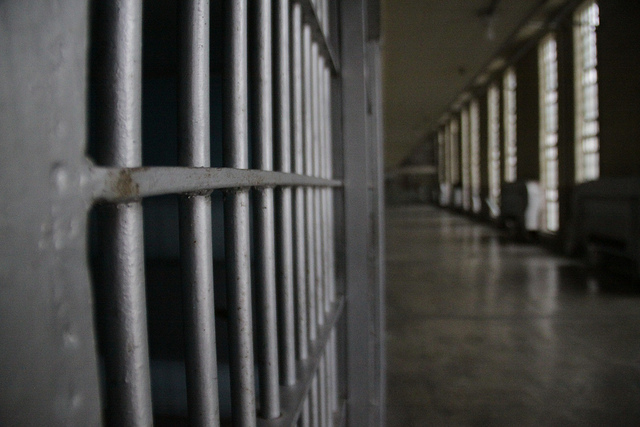It’s the final week of our supporter drive and we need your help to sign up 30 more supporters! Please help rabble.ca support democratic movements by Become a monthly supporter, or sharing this link with your friends and family:www.rabble.ca/donate
A scene in a new TV series captures a disturbing aspect of the contemporary zeitgeist (spirit of our age) that helps me understand why people are allowing Khaled Al-Qazzaz to languish in an Egyptian jail even though he has never been accused or charged of a crime. The show is The 100, a drama series described as Lost meets Hunger Games, where 100 young adults are sent down to find out if earth is habitable 97 years after an apocalypse drove humanity to live in an ‘ark’ in space.
The scene is this: unbeknownst to the inhabitants of the ark, humanity lived on, and the ‘grounders’ as they are called, begin attacking the 100 soon after they land. One grounder is captured, his arms strung up, and because he refuses to tell the youth which bottle contains the antidote to a poison he has inflicted on their friend, they whip him with straps and deliver electric shocks with cables.
The de-facto female leader of the 100, Clarke, had initially tried to stop the de-facto male leader, Bellamy, from beginning the whipping. “This is not who we are,” she implores, but finally consents when she cannot get the captured man to reply to her. Later on Bellamy tells Clarke: who we are and who we need to be are two separate things. She grudgingly agrees.
There was once a time when the silver screen projected a self-image of liberal-democratic ideals where ‘who we are and who we need to be’ were one and the same: even under fire, we were humane. We were not brutal or cruel; those qualities were left for the ‘bad guys’. A hero or heroine would never electric shock a prisoner into giving up an antidote: they would have demonstrated superior persuasive reasoning or non-violent strategic trickery skills to get the bad guy to hand it over. Bellamy and Clarke express a disturbing new trend that principles can be sacrificed to interests: a modern twist on the old adage ‘the end justifies the means.’
Khaled Al-Qazzaz, a University of Toronto graduate and father of four Canadian children, was arrested in Egypt because he was in the same room as the democratically elected President when the Egyptian military took over power. Al-Qazzaz was a civil servant, an employee of Egypt’s first-ever democratically elected government.
On July 3 2013, he was disappeared and has been held in jail without charge for an entire year. For 23 hours a day, he is in solitary confinement in a cell the size of a broom closet. What for? For being an employee of a democratically elected government? Since when is this a crime? But then again, journalists have been arrested for being journalists, as the ongoing ordeal of Canadian citizen Mohamed Fahmy shows us.
Sadly, ‘the end justifies the means’ philosophy tells us why not all in the Canadian government are doing everything in their power to help release Al-Qazzaz. It also tells us why some ordinary people say they have little sympathy for Al-Qazzaz, whose torturous confinement has led to the loss of use of one of his arms, left him unable to walk unassisted and whose blood pressure is at potentially fatal levels.
The realpolitik has it that the elected Egyptian government, its multi-party Cabinet, and its multitude of young professional employees from across the globe were in reality all and only Muslim Brotherhood. And because the realpolitik currently posits that the Muslim Brotherhood, which renounced violence in the 1970s, is in reality a terrorist organization, anyone who worked for them is by default a terrorist.
This dangerous guilt-by-association ideology places 34-year-old educator Al-Qazzaz — who, like so many others, was not a member of the Muslim Brotherhood — in great peril. But more importantly, it also tosses out the window our liberal-democratic commitments to the rule of law. Even if Al-Qazzaz were a member of the Muslim Brotherhood, due process requires charges and a fair trial, with the evidence for all to see. The fact that he has not been charged makes this point all the more pressing.
Protection from arbitrary arrest and detention is a basic human right in the 1948 Universal Declaration of Human Rights. It has also been incorporated as article 9 in the internationally binding International Covenant of Civil and Political Rights (1966), to which both Canada and Egypt are signatories. Are members of our public and our government prepared to abandon this right, justify Al-Qazzaz’ life-threatening prolonged solitary confinement, and separate ‘who we are’ from ‘who we need to be’ simply because he is now in Egypt and not in Canada?
Unless we agitate for Khaled’s release, we are answering ‘yes’ to this question. If we live in a world where the end justifies the means, like the nightmarish world of television’s Bellamy and Clarke, then welcome to the end of liberal-democracy. Welcome back to the dog-eat-dog world that 400 years ago Thomas Hobbes dubbed, “solitary, poor, nasty, brutish and short.”
It doesn’t need to be this way. Hundreds of years of struggle brought us the human rights and international law we have today. Canada used to be known as a country of peace-keeping committed to upholding international law. Let’s see this liberal-democracy in action, and push the Egyptian government to have Khaled released from jail and free from oppression.
Dr. Kathy Bullock is Lecturer in Political Science at University of Toronto, Mississauga.
Photo: flickr/meesh



